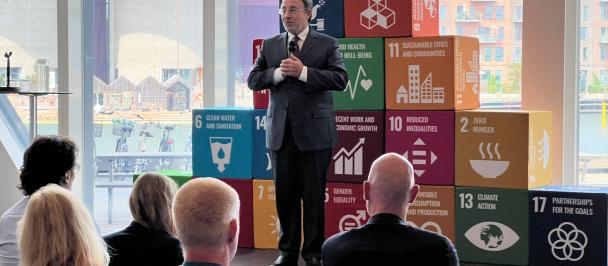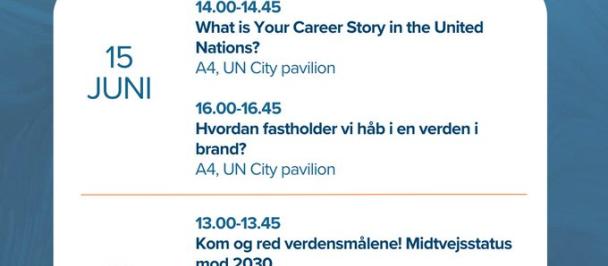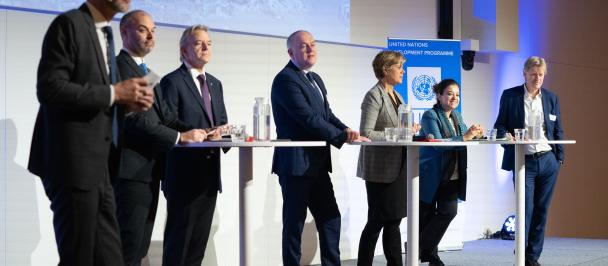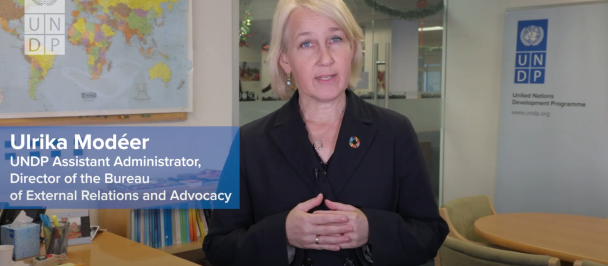Analysis reveals policy choices in many developing countries are severely limited, widening the gap between ambition and progress on the Sustainable Development Goals (SDGs), but also identifies innovative strategies to accelerate development
Tight fiscal and financial constraints are driving growth-at-all costs, according to United Nations Development Programme collaboration with 95 countries
12. September 2023

Based on new projections, the reports show that in the last three years, 72 out of the 95 economies increased their carbon emissions, with 38 of them exceeding a 10 percent increase. At the same time, only one in five countries reduced poverty levels since 2019, while poverty either remained the same or increased in 72 out of 95 countries.
New York - The United Nations Development Programme (UNDP) released new research today that shows securing the wellbeing of people and planet too often hangs in the balance of fiscal and financial constraints.
Developed in collaboration with 95 developing countries ahead of the upcoming UN Sustainable Development Summit, the analysis – SDG Insights, which comprises 95 separate reports - reveals that the default growth trajectories of most developing economies face hard fiscal and financial constraints that skew them towards carbon intensive and non-inclusive outcomes.
Countries recovering from recent shocks and crises are trapped in a cycle that pulls them away from the goals set out by the 2030 Development Agenda. This cycle is the gap between SDG ambition and meaningful progress.
After three years of concurrent crises, including a severe debt crisis that crowds out investment in social protection and energy transitions, developing countries are trapped in relentless pursuit of economic growth. Under current trends, the default growth trajectory for most developing countries is showing further turmoil in one or more of the economic, social, political and environmental spheres.
Based on new projections, the reports show that in the last three years, 72 out of the 95 economies increased their carbon emissions, with 38 of them exceeding a 10 percent increase. At the same time, only one in five countries reduced poverty levels since 2019, while poverty either remained the same or increased in 72 out of 95 countries.
Calling for support for developing countries, UNDP Administrator Achim Steiner said: “The 'development we want' - driven by human development, sustainable economic growth and continuous innovation, is frequently held hostage by the 'growth we get' driven by fossil fuel and mineral extraction, high commodity prices and unsustainable debt. SDG Insights is yet more evidence that clearly articulates this key issue faced by many developing countries. As we approach the UN Sustainable Development Summit, UNDP urges international action to achieve environmentally sustainable and inclusive economic growth – this will not be achieved by trickle-down economics or a quick fix. It will require an overhaul of the international financial architecture and of domestic policies to enable countries to better align their fiscal and financial resources to the SDGs.”
The SDG Insights highlight the importance for developing countries to invest in enabling environments for digital and green transitions. This requires institutional effectiveness, functioning justice systems and strong governance. The research lays out the strategies and tactics that countries are using to accelerate the SDGs, putting the focus on policy choices that drive progress across multiple SDGs.
UNDP Director of SDG Integration Laurel Patterson said: “By zeroing in on what’s happening at the national level, our analysis reveals that governments’ national priorities like jobs, infrastructure, cities and institutions can drive broader realignment of social, environmental, and economic progress. But to do so, these priorities must be linked with specific combinations of SDGs. This ultimately could change the patterns of growth.”
For example, more than half of the reports elevate decent work for all as a top priority for development. But countries like Egypt and Zambia are pinpointing the connections that amplify impact across several SDGs –promoting inclusion, youth empowerment and opportunities for women as policy combinations that ensure job creation is a driver of fair and sustainable outcomes.
Countries also prioritize resilient infrastructure and sustainable cities, particularly in the Asia and Pacific regions, as they have a clear impact on multidimensional poverty and intersect with other sustainable development priorities related to both climate and financing. This ‘SDG formula’ amplifies the criticality of infrastructure as a driver of innovation that protects vulnerable people and advances a green transition.
An example is Bhutan, where rapid urbanization is exacerbating the risk to populations of severe weather events, which in turn is driving a strong policy focus on sustainable cities. The government has identified integrated SDG policy choices that are mutually reinforcing across water resource management, with climate responsive urban planning and investments in green infrastructure. This connected approach provides win-wins across poverty and climate.
Lower- and middle-income countries overwhelmingly emphasize the importance of effective and accountable institutions as a foundation for sustainable growth and for public services delivery (particularly for health and education). For instance, Peru’s focus on effective and accountable institutions is seen as a driver of decent work and economic growth, tackling the challenges of informal economy and increasing access to public services for most of the vulnerable.
At the mid-point of the 2030 Agenda, SDG Insights represents unprecedented research, utilizing artificial intelligence and machine learning to analyze extensive datasets, as part of a consultative methodology, that can help countries and policymakers to drive their development agendas forward in innovative and more effective ways.
Read all the reports, insights and analysis on this dedicated website:https://sdgpush.undp.org
MEDIA CONTACT
Mette Fjalland: mette.fjalland@undp.org / +45 45 33 60 08
ABOUT UNDP
UNDP is the leading United Nations organization fighting to end the injustice of poverty, inequality, and climate change. Working with our broad network of experts and partners in 170 countries, we help nations to build integrated, lasting solutions for people and planet.

 Locations
Locations


